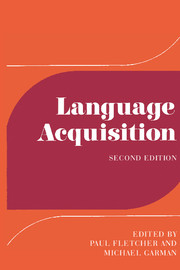Book contents
- Frontmatter
- Contents
- Contributors
- Preface
- Part I Contexts and determinants
- Part II The development of linguistic systems: phonology
- Part III The development of linguistic systems: grammar
- Part IV Later language development
- Notes to chapters
- Bibliography and citation index
- General index
- Titles in the series
Preface
Published online by Cambridge University Press: 05 June 2012
- Frontmatter
- Contents
- Contributors
- Preface
- Part I Contexts and determinants
- Part II The development of linguistic systems: phonology
- Part III The development of linguistic systems: grammar
- Part IV Later language development
- Notes to chapters
- Bibliography and citation index
- General index
- Titles in the series
Summary
In the time elapsed since the first edition of this book, in 1979, the field has inevitably altered. The fundamental requirement remains the same – the description and explanation of changes in the child's language as he or she gets older – but in our perception the responses to this task in the mid-eighties are different in some important respects to those prevalent in the late seventies. There has been no dramatic theoretical advance, it is true: no dominant theoretical framework has emerged to change and unify our approaches to the data. Indeed it is as true now as it was in 1979 that there is no one theoretical position that seems adequate to explain the range and complexity of data available to us. Nevertheless, there have been fruitful theoretical developments. The learnability hypothesis has been influentially expounded. Developments in grammatical theory have been shadowed by energetic experimental work that seeks evidence of quite specific language capacities in children. And by now traditional (i.e. Piagetian) cognitive accounts of language development have been supplemented by social-interactive views that owe more to Vygotsky. It is these movements, together with developments in areas which were covered in the first edition – child-directed speech, cognition and language variation – that have persuaded us to augment the Contexts and determinants section, and to move it to a more prominent place in this revised edition.
- Type
- Chapter
- Information
- Language AcquisitionStudies in First Language Development, pp. xi - xiiPublisher: Cambridge University PressPrint publication year: 1986



